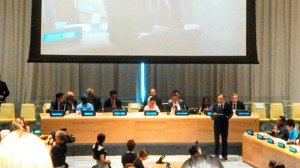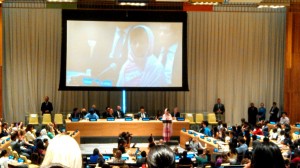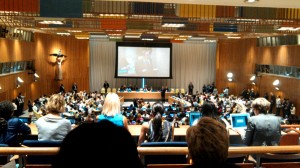by Lauren Kaufmann, rising senior at the University of Pennsylvania and WEDO’s Research and Outreach Intern who attended “Malala Day” on July 12th, 2013.
The General Assembly Hall at UN Headquarters was standing-room only on Friday, July 12. A torrent of camera clicks were heard as a booming rendition of “Happy Birthday” was sung by everyone in the audience to the now-sixteen year old Malala Yousufzal .
Last October Malala made global headlines after be shot by the Taliban for advocating girls’ education. Her sixteenth birthday was the first time she spoke publically since the attack and her subsequent hospitalization in the UK. This year, she is a nominee for the Nobel Peace Prize.
Secretary-General Ban Ki-Moon opened the event by reflecting upon his own education in war-torn Korea, and discussed the importance of maintaining education during periods of conflict. The Millennium Development Goals included global, universal education by 2015, but 57 million children still fail to receive primary-school education –and the numbers are getting worse in conflict zones. Malala Day is meant to serve as a reminder of the work still to be done.
Surrounded by youth delegates from 85 countries, Malala then took the stage to discuss the importance of global, universal education. She discussed her attack and said, “I’m not against anyone. Neither am I here to speak in terms of personal revenge against the Taliban or any other terrorist group. I’m here to speak for the right of education for every child.” She told the audience, “We realize the importance of light amid darkness” while discussing the impact of the attack upon her life: out of terror she has found courage.
Malala emphasized the power of education to transform individuals, communities, and the globe, saying that just one teacher or book or pen can move the world. This is the future she wants—one in which every child has access to an education empowering them to live healthy, happy lives— and this is why she’s fighting for it. She said, “Here I stand, just one girl among many. I speak so those without voice can be heard.”
In particular, Malala discussed why she focuses on advocating for rights of women and girls. Creating gender parity in primary and secondary education is one of most prominent challenges facing the goal of universalizing education—and, as WEDO believes, gender equality in education is critical to empowering women to be leaders in every field. “There was a time when women asked men to stand up for their rights,” she said. “This time, we will do it ourselves.”
See Photos:





